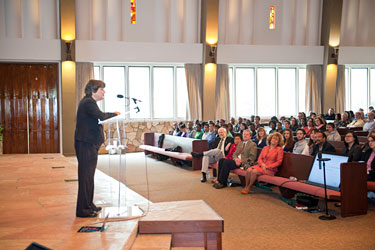Learn More About PUC
Sister Helen Prejean at PUC: "End the machinery of death"
By Larry Peña on May 4, 2012
Share this

At a campus wide program at Pacific Union College May 3, Sister Helen Prejean, the noted social activist and author of Dead Man Walking, called for the end of the death penalty and a shift in focus from retributive to redemptive justice. Prejean’s appearance in the Napa Valley comes less than two weeks after an initiative to end the death penalty in California qualified to appear on the ballot in the upcoming November election.
“The Supreme Court says that the death penalty should only be reserved for the worst of the worst murder cases—but how in the Sam Hill do we know which is the worst of the worst?” said the Louisiana-born nun who was portrayed by Susan Sarandon in a 1995 film based on her book. “Every murder is the worst of the worst…we don’t even know how to apply the standards.”
A nun in the Congregation of St. Joseph, Prejean called attention to what she sees as an extreme paradox—the religious justification for executing criminals and the merciful figure of Jesus Christ found in the Bible. “We have gotten ourselves to a point in this country where we try to make violence redemptive,” she said. “Nothing could be further from the gospel of Jesus.”
She related how she at first tried to focus on the moral arguments for ending the death penalty—only to discover that for many, the practical arguments were just as compelling. “You spend $4 billion to execute 13 people. You pay $180 million a year to keep this death machinery in place, and on average you execute someone every 20 years,” she said.
For her, those numbers begged the question of how states that practice the death penalty could be putting that money to better use. “Can we end the machinery of death and put those resources into at-risk kids? Into health care for people? Into affordable housing? Into education?” she asked. “Look at California. In 28 years you’ve built 27 prisons and one university, and you’re cutting the education budget.”
Prejean concluded her presentation to a standing ovation from the campus audience. Following the program, she signed copies of Dead Man Walking, as well as her follow-up book Death of the Innocents, which details cases of wrongful convictions that led to executions.
At a luncheon following the morning programs, PUC president Heather J. Knight hosted Prejean, as well as college administrators, faculty, and student leaders of the PUC chapter of Amnesty International. Prejean encouraged the student activists to prepare for a hard fight on the November vote. If the measure passes, the 720 California inmates currently on death row would have their sentences changed to life without the possibility of parole.
Prejean is passionate about much more than just ending the death penalty—she sees capital punishment as just one part of a struggle against economic and social inequality in the United States. “Look who’s on death row across the United States. Ninety-eight percent or higher are poor people,” she says. “The street saying is, ‘Capital punishment means them without the capital gets the punishment.’”
California currently has the most inmates on death row, far surpassing even the swath of the Deep South that Prejean calls the “Execution Belt states.” “It’s up to the discretion of the prosecutor whether to pursue the death penalty,” she says. “It’s pure political symbolism…get a death sentence and you’ll look tough on crime. It couldn’t be more superficial.”
Despite her claim that the U.S. has become a “punishing society,” Prejean is optimistic that with education, the American public will eventually come around to her side. “I’ve discovered that most people aren’t wedded to the death penalty—they just never think about it,” she says.
She’s calling on college students and other activists around the state to help with spread her message in advance of the November election. “They get awake on it. They get that knowledge and get really active in their state,” she says. “It’s gonna take massive education, because if [the death penalty] is upheld, it’s going to be much more difficult.”
Latest News
Maxwell Scholar Feature: Liah Ronneburg
By Marina Maher on December 30, 2025
First Set of PUC’s North Coast Nursing Students Graduate
By Ally Romanes on December 23, 2025
Two Tonge Grants Awarded to M.A. in Communication and Aviation Program
By Marina Maher on December 22, 2025
PUC’s College Days Creates Lasting Connections
By Ally Romanes on December 18, 2025
